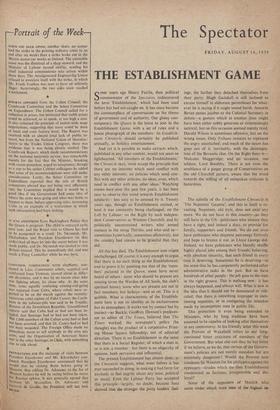Portrait of the Week— WHEN ONE DOOR OPENS, another shuts;
no sooner had the strike in the printing industry come to an end after six weeks than a strike broke out in the Morris motor-car works at Oxford. The ostensible cause was the dismissal of a shop steward, and the Minister of Labour moved swiftly, sending his chief industrial commissioner into action within three days. The Amalgamated Engineering Union refused to associate itself with the strike, in which Mr. Frank Foulkes was seen to have an unlovely finger. Surprisingly, the two sides soon reached a settlement.
REPORTS APPEARED from the Cohen Council, the Cranbrook Committee and the Select Committee on Expenditure. The Cohen Council called for a reduction in prices, but intimated that stable prices could be achieved, so to speak, at too high a cost. It also criticised the principle of nation-wide wage negotiations, suggesting that more could be done at local and even factory level. The Report was received with an almost total lack of public in- terest, but from the National Union of Manufac- turers to the Trades Union Congress, there was evidence that it was being closely studied. The Cranbrook Report, which made recommendations on the national maternity service, was remarkable mainly for the fact that the Minister, breaking with recent precedent, urged its acceptance; though as a sop to his senior Cabinet colleagues he added that some of its recommendations were still under consideration. Lastly, the Select Committee on Expenditure reported that the sale of British armaments abroad was not being very efficiently run; the Committee implied that it would be a good idea if the Government had some idea of where the arms were going and what was liable to happen to them, before approving sales; instancing Cuba as an example of a transaction in which such informationhad been lacking.
*
IT WAS ANNOUNCED from Buckingham Palace that the Queen is pregnant. The child is expected early next year, and the Royal visit to Ghana has had to be postponed as a result. Dr. Nkrumah, Mr. Diefenbaker and President Eisenhower (in that order) had all been let into the secret before it was made public, and Dr. Nkrumah was invited to visit Britain instead. This he immediately did, and was made a Privy Councillor while he was here.
*
CONFUSION, COMPOUNDED WITH elephants. con- tinued in Ltios. Communist rebels, supplied and reinforced from Vietnam, moved about in differ- ent directions, and it was by no means clear who Was fighting whom, let alone why. At the same time, some equally confusing coming-and-going Was reported from Cuba, where rebels were re- Ported to be on the march against the recently- victorious rebel regime of Fidel Castro; the Carib- bean in the tobacco-pile was said to be Trujillo. dictator of the Dominican Republic. Unconfirmed reports said that Cuba had or had not been in- vaded, that Santiago had or had not been taken, that 1,000 members of the Cuban army had or had not been arrested, and that Dr. Castro had or had not been wounded. The Foreign Office made no immediate move to sell anybody in the area any arms. and the Organisation of American States Met in the other Santiago, in Chile, with something else to talk about.
*
PREPARATIONS FOR the exchange of visits between President Eisenhower and Mr. Khrushchev con- tinued. President Eisenhower announced that he would also be ,visiting Bonn before going to Moscow, thus adding Dr. Adenauer to the list of Western leaders he will be seeing before he meets the Russian sphinx. It was generally agreed that between Mr. Macmillan, Dr, Adenauer and General de Gaulle, the President will not lack
vice.


































 Previous page
Previous page